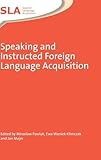Speaking and Instructed Foreign Language Acquisition / ed. by Mirosław Pawlak, Ewa Waniek-Klimczak, Jan Majer.
Material type: TextSeries: Second Language AcquisitionPublisher: Bristol ; Blue Ridge Summit : Multilingual Matters, [2011]Copyright date: ©2011Description: 1 online resource (320 p.)Content type:
TextSeries: Second Language AcquisitionPublisher: Bristol ; Blue Ridge Summit : Multilingual Matters, [2011]Copyright date: ©2011Description: 1 online resource (320 p.)Content type: - 9781847694119
- 9781847694126
- Language and languages -- Study and teaching
- Second language acquisition
- LANGUAGE ARTS & DISCIPLINES / Linguistics / Psycholinguistics
- SLA
- Second Language Acquisition
- foreign language learning
- language instruction
- language teaching
- second language learning
- speaking in a foreign language
- teaching foreign language
- 418.0071 22
- P51 .S587 2011
- P51 .S64 2011eb
- online - DeGruyter
| Item type | Current library | Call number | URL | Status | Notes | Barcode | |
|---|---|---|---|---|---|---|---|
 eBook
eBook
|
Biblioteca "Angelicum" Pont. Univ. S.Tommaso d'Aquino Nuvola online | online - DeGruyter (Browse shelf(Opens below)) | Online access | Not for loan (Accesso limitato) | Accesso per gli utenti autorizzati / Access for authorized users | (dgr)9781847694126 |
Browsing Biblioteca "Angelicum" Pont. Univ. S.Tommaso d'Aquino shelves, Shelving location: Nuvola online Close shelf browser (Hides shelf browser)

|

|

|

|

|

|

|
||
| online - DeGruyter Immersion Education : Practices, Policies, Possibilities / | online - DeGruyter L2 Interactional Competence and Development / | online - DeGruyter Reflections on Translation / | online - DeGruyter Speaking and Instructed Foreign Language Acquisition / | online - DeGruyter Language and Learning in the International University : From English Uniformity to Diversity and Hybridity / | online - DeGruyter Lexical Errors and Accuracy in Foreign Language Writing / | online - DeGruyter Discourse, Identity, and China's Internal Migration : The Long March to the City / |
Frontmatter -- Contents -- Contributors -- Preface -- Part 1: Theoretical Perspectives on Instructed Acquisition of Speaking -- Chapter 1. Instructed Acquisition of Speaking: Reconciling Theory and Practice -- Chapter 2. Authenticity in Oral Communication of Instructed L2 Learners -- Chapter 3. Formulaic Sequences in the Output of Instructed L2 Learners -- Chapter 4. Formulaicity vs. Fluency and Accuracy in Using English as a Foreign Language -- Chapter 5. Talking the Same Language: Sociocultural Aspects of Code-Switching in L2 Classroom Discourse -- Chapter 6. Speaking in English for Academic Purposes in the Light of Lingua Franca English and Sociocultural Theory -- Part 2: Speaking and Individual Variables -- Chapter 7. Near-Nativeness as a Function of Cognitive and Personality Factors: Three Case Studies of Highly Able Foreign Language Learners -- Chapter 8. ‘‘I Am Good at Speaking, But I Failed My Phonetics Class’’ - Pronunciation and Speaking in Advanced Learners of English -- Chapter 9. Oral Skills Awareness of Advanced EFL Learners -- Chapter 10. Pronunciation Learning Strategies - Identification and Classification -- Chapter 11. Metaphonetic Awareness in the Production of Speech -- Chapter 12. Foreign Language Speaking Anxiety from the Perspective of Polish Students of German Studies -- Chapter 13. The Relationship between Language Anxiety and the Development of the Speaking Skill: Results of a Longitudinal Study -- Part 3: Research into Instructed Acquisition of Speaking -- Chapter 14. On the Authenticity of Communication in the Foreign Language Classroom -- Chapter 15. Ways to Proficiency in Spoken English as a Foreign Language - Tracing Individual Development -- Chapter 16. Task Repetition as a Way of Enhancing Oral Communication in a Foreign Language -- Chapter 17. The Use of the Internet and Instant Messengers in Assisting the Acquisition of Speaking Skills in English Lessons -- Chapter 18. Investigating the Perception of Speaking Skills with Metaphor-Based Methods -- Chapter 19. Phonetically Difficult Words in Intermediate Learners’ English -- Chapter 20. Transcultural Interference, Communities of Practice and Collaborative Assessment of Oral Performance
restricted access online access with authorization star
http://purl.org/coar/access_right/c_16ec
Developing the ability to speak in a foreign language is an arduous task. This is because it involves the mastery of different language subsystems, simultaneous focus on comprehension and production, and the impact of a range of social factors. This challenge is further compounded in situations in which learners have limited access to the target language. Thus, there is a need to explore issues related to teaching, learning and testing speaking with a view to translating the guidelines based on theoretical positions and research findings into feasible and context-specific pedagogical recommendations. This is the rationale behind this book, which considers speaking from leading theoretical perspectives, investigates individual variables which affect its development, and reports the results of studies focusing on different aspects of its instructed acquisition.
Mode of access: Internet via World Wide Web.
In English.
Description based on online resource; title from PDF title page (publisher's Web site, viewed 01. Dez 2022)


